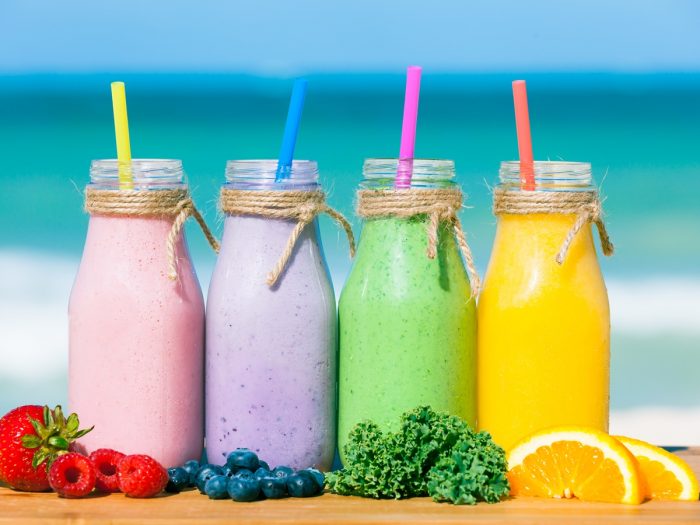There are countless diets on the market that promise incredible results, but going on a liquid diet can have several impressive benefits if they are pursued safely and responsibly. If you are looking for a quick and effective way to lose weight, detoxify the body and stimulate the metabolism, a liquid diet might be precisely what you need. However, for anyone with poor health, a liquid diet can be dangerous. Before embarking on any new dietary trend, it is important to know the details of what is expected, what health benefits can be gained, and what potential side effects you may experience.
What Are Liquid Diets?

Smoothies are a healthy and delicious breakfast option. Photo Credit: Shutterstock
As their name implies, a liquid diet consists of eliminating solid foods from your diet for a limited period, typically between 1 and 3 days, although some people stretch liquid diets to a week or more. Instead of the solid foods that most of us eat every day, those foods are instead replaced by liquids, juices, vegetables, and meat-based broths. Some people choose to go on liquid diets for personal reasons (e.g., health and wellness), while others may go on a liquid diet due to an upcoming surgery or procedure. Specific restrictions on food and activity may be different based on your reason for going on the diet, so consulting with your doctor is highly recommended. [1]
Benefits of Liquid Diets
The potential benefits of liquid diets include weight loss, a boosted metabolic rate, detoxification of the body and improved organ function, among others.
Weight Loss
The primary reason for most people going on a liquid diet is the goal of weight loss. By drastically reducing your caloric intake, often by more than 50%, you will create a calorie deficiency in the body – meaning that more calories are being burned than are being consumed. This is the foundation of weight loss and can be easily achieved – sometimes up to 1 pound per day – on a liquid diet. [2]
Boosted Metabolism
When your body is denied calories, the metabolism will slow down to save energy, which typically isn’t a good thing. However, this can train your body to work more efficiently with a reduced level of calories. Unfortunately, many people report their metabolism-speeding back up after the diet is over, causing the weight to return and improvement of the metabolism to be lost. [3]
Eliminate Toxins
When we eat solid foods, the body works to eliminate toxins and puts forth an effort to dissolve those foods. On a liquid diet, more of a focus is on the detoxifying organs of the body, allowing them to cleanse the system and essentially play “catch up”. More liquid helps to flush the kidneys and bladder, and eliminate stored toxins in the colon and digestive tracts. [4]
Improved Organ Function
Vegetable and fruit juices are essential during a liquid diet, which will provide the body with abundant nutrients, vitamins, and minerals. This can improve the function of all your organ systems, including the nervous system.
Are Liquid Diets Safe and Effective?
There is a considerable amount of debate about liquid diets, as the effects can vary widely between individuals. As mentioned above, one of the main goals of someone on a liquid diet is weight loss, but this diet is known to produce temporary results in some people. A lot of the loss you experience on a liquid diet is water weight, or it is due to a major calorie deficiency. In many cases, when you return to your normal dietary patterns, the weight you lose may be quick to return. However, for those who maintain healthier dietary habits following a liquid diet stint may see more long-term effects. The short-term effects are clear, although some of the claims of health benefits are debated in academic circles.
In terms of safety, there are a few concerns that should be considered, such as constipation, a loss of lean muscle mass and symptoms of nutrient and caloric deficiency. When liquid diets are followed healthily, many of these symptoms can be avoided.
Constipation: When you cut out solid foods, particularly the pulp and skin from fruits and vegetables, you are losing a lot of dietary fiber in your diet. This can result in a slower digestive process, as well as constipation, bloating, cramping and stomach discomfort. [5]
Nutrient Deficiency: While cutting back calories is natural on a liquid diet, eliminating too many daily nutrients can result in side effects like fatigue, stomach discomfort, cognitive confusion, muscle weakness, and headaches. [6]
Muscle Mass: During a liquid diet, your body may begin using your lean muscle mass as a source of energy. For most people, who work hard to establish their muscle mass, this is an unwanted side effect, particularly of an extended liquid diet. [7]
What Do You Eat on a Liquid Diet?
On a liquid diet, as you might expect, your diet is limited to liquid intake, which can include pulp-free juice, milk, fruit smoothies with peeled fruits and yogurt, chicken, beef and vegetable broths, kefir, pureed soups, milkshakes, sherbet, ice cream, fruit bars, avocado and certain forms of tofu. Anything that can be turned into a pure liquid can be consumed on a liquid diet, and in some cases, depending on your goals, foods like light cereals and oatmeal are allowed, particularly if they are diluted with milk or water.
